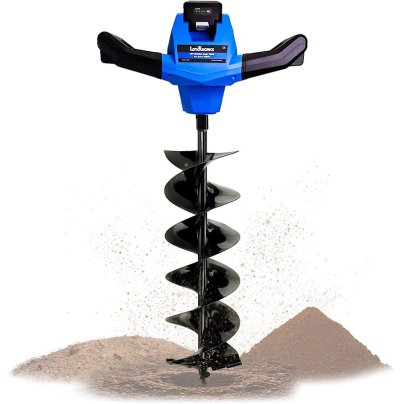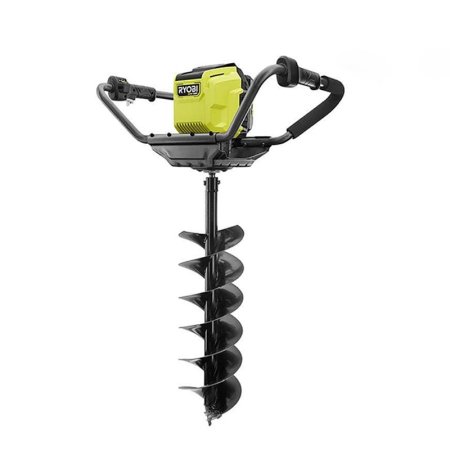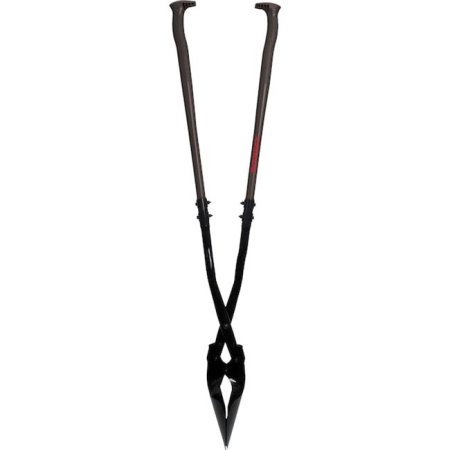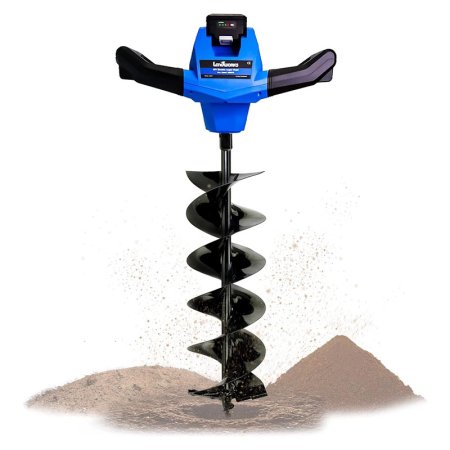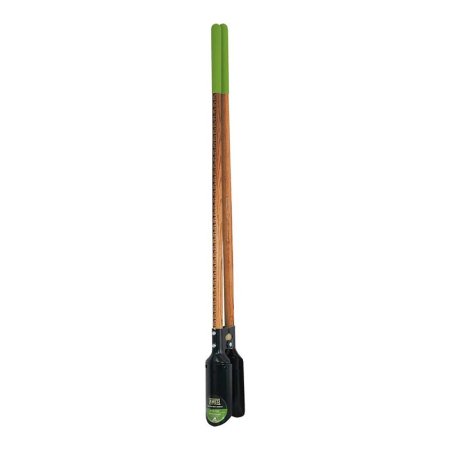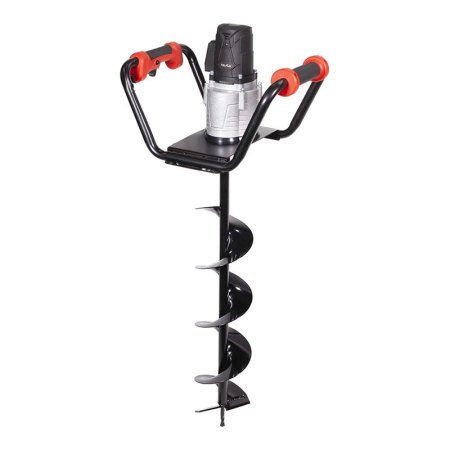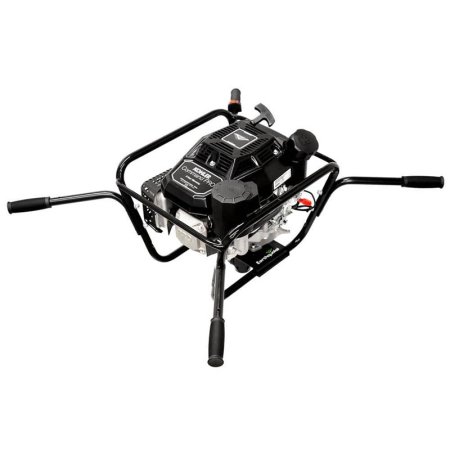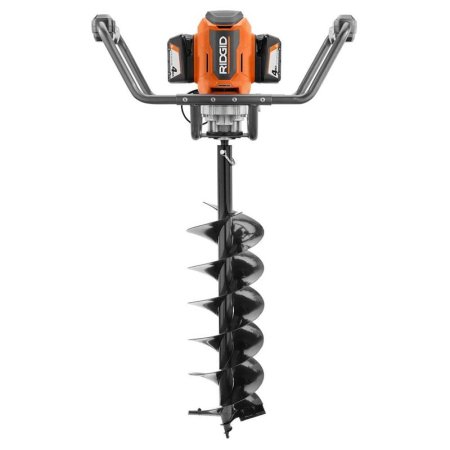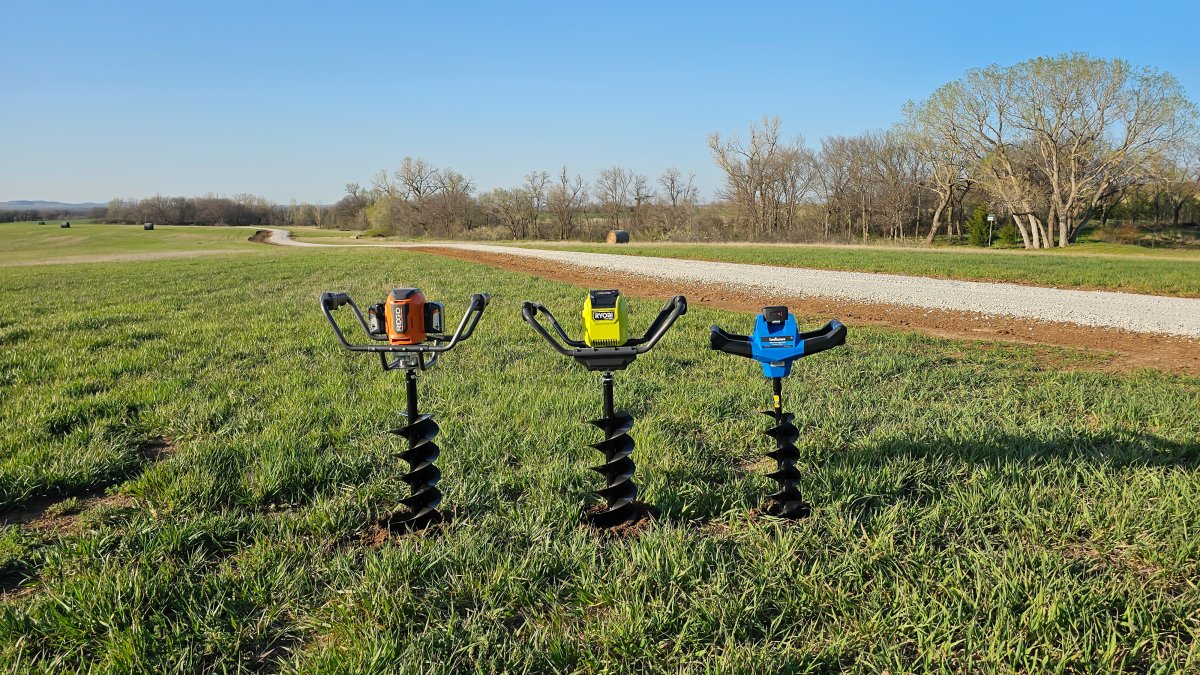
We may earn revenue from the products available on this page and participate in affiliate programs. Learn More ›
Building fences is challenging, but using post hole diggers can save time and labor. We researched more than 35 models and selected the best for hands-on testing in our own yards.
Post hole diggers come in two types: manual and powered. Both are an improvement over using a shovel to dig, but they still require physical strength. Whether installing a fence post, cultivating holes for small trees, or installing tubes for concrete, you can save time and effort with one of these digging tools. Our top recommendation is the 8-inch model from Ryobi, thanks to its powerful torque and intuitive design. Discover our best shopping tips and find out how the following models fared in our tests and earned a spot on this lineup of the best post hole diggers.
- BEST OVERALL: Ryobi 40V HP Brushless 8″ Earth Auger Kit
- BEST BANG FOR THE BUCK: Razor-Back Fiberglass Handle Post Hole Digger
- BEST LIGHT-DUTY: Landworks 48V Cordless Electric Earth Auger
- BEST MANUAL: Ames Post Hole Digger With Ruler
- BEST CORDED ELECTRIC: XtremePowerUS 1500W Electric Post Hole Digger
- BEST 2-PERSON: Earthquake 2-Person Earth Auger Powerhead
- BEST CORDLESS BATTERY: Ridgid 18V Earth Auger with 8″ Bit
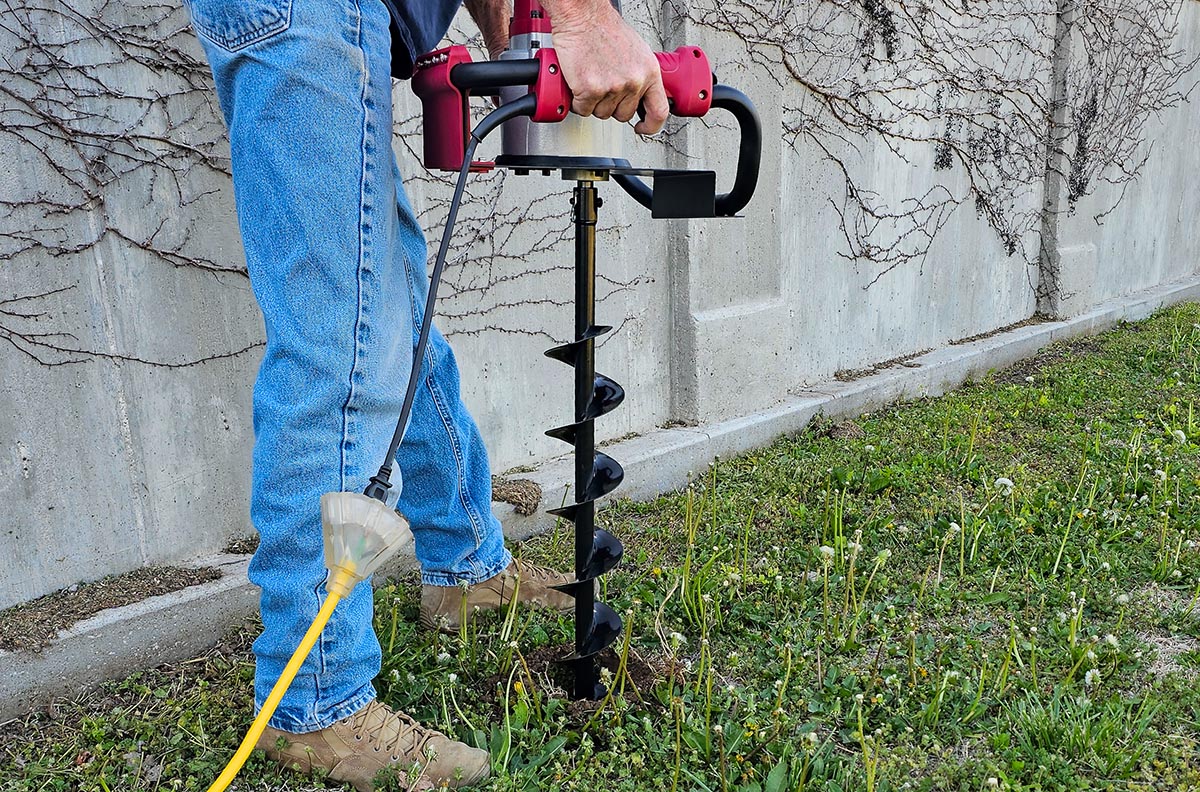
| Type | Depth capacity | Weight | |
| Ryobi 40V HP Brushless 8″ Earth Auger Kit | Cordless electric | 32 inches | 34 pounds |
| Razor-Back Fiberglass Handle Post Hole Digger | Manual | Not listed | 10 pounds |
| Landworks 48V Cordless Electric Earth Auger | Cordless electric | 30 inches | 22 pounds |
| Ames Post Hole Digger With Ruler | Manual | Not listed | 6 pounds |
| XtremePowerUS 1500W Electric Post Hole Digger | Corded electric | 31.5 inches | 29.4 pounds |
| Earthquake 2-Person Earth Auger Powerhead | Gas-powered | Auger bit sold separately | 55 pounds |
| Ridgid 18V Earth Auger with 8″ Bit | Cordless electric | 32 inches | 34 pounds |
Our Top Picks
The following post hole diggers excelled in our tests. They vary by power source, weight, type, and cost. You’ll find both manual and power models in the lineup, and one is sure to be a good choice for your hole-digging needs.
Best Overall
Ryobi 40V HP Brushless 8" Earth Auger Kit
What We Like
- Provides powerful torque
- All tools included for a quick, straightforward assembly
- Offers 2 speeds plus reverse to make digging easier
What We Don’t Like
- Not suitable for rocky soil or large tree roots
- Requires physical strength to balance and control
Product Specs
- Type: Cordless electric
- Depth capacity: 32 inches
- Weight: 34 pounds
Our Ratings: Ease of Use 5/5; Ergonomics 4.5/5; Performance 4.75/5; Build Quality 5/5; Value 4.5/5
We were impressed by the Ryobi RY40710’s digging power, user-friendly design, and safety features. It comes with a 40-volt battery and charger and features an 8-inch auger bit that’s 32 inches long.
The included 40-volt battery took 2 hours to charge, but after drilling 19 test holes, the battery still had ample charge. Drilling was straightforward; it took about 2 minutes to drill a 30-inch hole, and all we had to do was balance the tool—the Ryobi did the rest.
Operating the RY40710 is intuitive; the buttons are on the right-hand handle and include two speeds and reverse. The auger offers kickback protection, and while we didn’t hit any tree roots or large rocks, the safety feature is designed to halt the auger’s rotation to keep it from wrenching the user’s arms. It’s a nice perk.
Read our full review: Ryobi 40V HP Brushless 8″ Earth Auger Kit
Get the Ryobi post hole digger at The Home Depot.
Best Bang for the Buck
Razor-Back Fiberglass Handle Post Hole Digger
What We Like
- Budget-friendly digger compared to powered models
- Ergonomic grips prevent knuckles from banging together
- Sharpened blades and 10-pound weight help drive into soil
What We Don’t Like
- Requires quite a bit of physical strength
- Best results in light, loamy soil types
Product Specs
- Type: Manual
- Depth capacity: Not listed
- Weight: 10 pounds
Our Ratings: Ease of Use 4/5; Ergonomics 4/5; Performance 4/5; Build Quality 5/5; Value 4/5
Lighten your digging load without spending too much. The Razor-Back post hole digger is a manual model, so we had to do a bit more work. However, it made digging the holes easier than it would have been with a good shovel.
We aligned the tool and then dropped it forcefully to drive its pointed blades into the ground. By spreading the handles, we could grab the soil between them, lift it out, and set it aside. We kept repeating the process, and the hole got deeper each time. We estimated it took about 35 drops to dig a hole 30 inches deep.
Its sharpened blades and 10-pound weight (slightly heavier than similar models) helped drive the digger into the soil. We like the ergonomic handle grips designed to keep our knuckles from banging together. Overall, the Razor-Back is a high-quality manual post hole digger that comes at an affordable price point.
Get the Razor-Back post hole digger at Lowe’s or The Home Depot.
Best Light-Duty
Landworks 48V Cordless Electric Earth Auger
What We Like
- Grip-mounted trigger and a sturdy handle
- Lightweight and cordless functionality
- No gas fumes or noise to worry about
What We Don’t Like
- Limited battery life
Product Specs
- Type: Cordless electric
- Depth capacity: 30 inches
- Weight: 22 pounds
Our Ratings: Ease of Use 4.5/5; Ergonomics 5/5; Performance 4.5/5; Build Quality 4.5/5; Value 4.75/5
Think all power augers are heavy? Think again. The Landworks Earth Auger weighs 22 pounds, yet it is powerful despite its weight. It comes with wide handles and a grip-mounted trigger for added control, and its 6-inch auger bit is 30 inches long.
We dug about 20 holes before its 48-volt battery started to drag. If you have a lot of holes to dig, consider buying a spare battery to swap in when one runs out.
This auger offers forward and reverse and comes with something we hadn’t seen before: a bright LED light to illuminate the digging area. In most cases, you won’t be digging holes at night, but the LED light might be helpful if you need to dig a few more before the sun goes down.
The Landworks auger might not be able to dig in packed ground, but if your soil is lightweight and rock-free, it’s a powerful little post hole digger.
Get the Landworks post hole digger at Amazon, Lowe’s, Tractor Supply Co., or Walmart.
Best Manual
Ames Post Hole Digger With Ruler
What We Like
- Handy measuring stick on the handle
- Cushioned grip
- Much more affordable alternative
What We Don’t Like
- Not suitable for digging through tree roots or rocky soil
Product Specs
- Type: Manual
- Depth capacity: Not listed
- Weight: 6 pounds
Our Ratings: Ease of Use 4/5; Ergonomics 4/5; Performance 4/5; Build Quality 4.5/5; Value 4.5/5
This Ames manual post hole digger has a 6.25-inch spread at the tip of the blades, and it weighs just 6 pounds, making it both portable and versatile. It has smooth hardwood handles with cushioned grips to help avoid blisters and hand fatigue.
While the Ames digger doesn’t come with many bells and whistles, one of our favorite features was a ruler on the side of the handle that let us see how deep the hole was as we dug.
The Ames is a big step up from digging with a shovel, but it does require a measure of physical fortitude. You won’t be removing much soil with each drop-and-scoop, but using a manual digger like the Ames is the safest way to go if you’re digging in an area with buried lines.
Get the Ames post hole digger at Amazon or The Home Depot.
Best Corded Electric
XtremePowerUS 1500W Electric Post Hole Digger
What We Like
- Consistent power provided by corded auger
- Handles are padded and wide-set
- Features a 31.5-inch auger bit that’s 6 inches in diameter
What We Don’t Like
- To avoid kickback, do not hold this auger with a death grip
Product Specs
- Type: Corded electric
- Depth capacity: 31.5 inches
- Weight: 29.4 pounds
Our Ratings: Ease of Use 5/5; Ergonomics 4.25/5; Performance 4.75/5; Build Quality 4.5/5; Value 4.25/5
It’s tough to beat the constant power of an electric post hole digger. The 1,500-watt auger from XtremePowerUS provides all the muscle needed to dig hole after hole in rock- and root-free soil.
We really liked the power of this auger; it gets right down to business and digs with a vengeance. However, it doesn’t offer anti-kickback technology, so keep a light touch on the handles and be ready to release them if the auger hits a rock. The kickback with an auger this powerful can sprain or break a wrist. For the safest results, use this auger (and all handheld power augers) in soil that doesn’t have large rocks or tree roots.
The handles on this auger are especially nice; they’re padded and set just wide enough to allow for maximum balance and control. It will dig a lot of holes quickly. It weighs 29.4 pounds and comes with a 31.5-inch bit that’s 6 inches in diameter.
Get the XtremePowerUS 1,500-watt post hole digger at Amazon, The Home Depot, or Walmart.
Best 2-Person
Earthquake 2-Person Earth Auger Powerhead
What We Like
- Powerful enough to dig even in dry, hardened ground
- 2-person operation allows for better stability and control of the auger
- Accepts standard auger bits up to 14 inches in diameter
- Recoil start is reliable and easy to pull
What We Don’t Like
- Relatively heavy at 55 pounds
- Parts of a gasoline engine can become very hot during use
Product Specs
- Type: Gas-powered
- Depth capacity: Auger bit sold separately
- Weight: 55 pounds
Our Ratings: Ease of Use 4/5; Ergonomics 4.5/5; Performance 5/5; Build Quality 5/5; Value 4.25/5
When faced with large digging projects, it helps to have an auger two people can hold on to, like the Earthquake Earth Auger powerhead.
This is only a powerhead, but it accepts standard auger bits up to 14 inches in diameter. We tested it with an 8-inch bit we borrowed from another auger we tested. The gas-powered Earthquake features a recoil start, something we typically shy away from because we have too much experience cranking small gas motors without success. Thankfully, this auger started up on the second pull.
We were able to dig holes easily with the Earthquake. It’s well balanced, and its 55 pounds are all that’s needed to put pressure on the auger bit so it drills quickly. We also found it could be used in a pinch by just one person.
Get the Earthquake post hole digger at The Home Depot or Tractor Supply Co.
Best Cordless Battery
Ridgid 18V Earth Auger with 8" Bit
What We Like
- Ample power for digging large holes quickly
- Anti-kickback helps prevent wrist injuries
- Well-balanced design makes the unit easy to control
What We Don’t Like
- Slightly on the heavy side at 34 pounds
Product Specs
- Type: Cordless electric
- Depth capacity: 32 inches
- Weight: 34 pounds
Our Ratings: Ease of Use 5/5; Ergonomics 4.5/5; Performance 4.75/5; Build Quality 5/5; Value 4.25/5
The double 18-volt 4 Ah rechargeable batteries that come with the Ridgid auger offer more than enough power to dig several holes quickly. At 34 pounds, it is slightly heavier than some of the other models, but once it starts digging, the unit is so well balanced it’s easy to control.
In our seemingly rock-free field, we nonetheless hit a hefty rock with the Ridgid auger. Fortunately, this model comes with anti-kickback. The auger bit immediately stopped spinning, so we didn’t suffer any wrist injuries. We dug about 20 holes with the 8-inch bit and didn’t hit any more rocks. At the end of our testing, the Ridgid still had ample battery power.
The auger accepts any Ridgid 18V batteries, so users of other Ridgid tools can swap batteries. It also offers two speeds and a reverse function.
Get the Ridgid post hole digger bit at The Home Depot, Amazon, or Walmart.
Jump to Our Top Picks
How We Tested the Best Post Hole Diggers
Testing Stats
- Products tested: 7
- Hours spent testing: 16
- Tests performed: 1 (digging holes)
- Average depth: 32 inches
- Price range: $50 to $600
We began by carefully researching the latest post hole diggers on the market, focusing on quality, consumer satisfaction, and cost.
After selecting the top models in various categories, we started digging. We dug dozens of holes in an agricultural field where large rocks had previously been removed. The soil was a combination of silt, loam, and clay, which is challenging to dig when very dry. When we tested, the soil was slightly moist and moderately hard to dig.
Each post hole digger was awarded points based on a rubric. The better it fared on an assessment, the higher the points. After testing, we used the scores to determine our top performers and the best uses for each model.
| Ease of Use | Ergonomics | Performance | Build Quality | Value | |
| Ryobi 40V HP Brushless 8″ Earth Auger Kit | 5 | 4.5 | 4.75 | 5 | 4.5 |
| Razor-Back Fiberglass Handle Post Hole Digger | 4 | 4 | 4 | 5 | 4 |
| Landworks 48V Cordless Electric Earth Auger | 4.5 | 5 | 4.5 | 4.5 | 4.75 |
| Ames Post Hole Digger With Ruler | 4 | 4 | 4 | 4.5 | 4.5 |
| XtremePowerUS 1500W Electric Post Hole Digger | 5 | 4.25 | 4.75 | 4.5 | 4.25 |
| Earthquake 2-Person Earth Auger Powerhead | 4 | 4.5 | 5 | 5 | 4.25 |
| Ridgid 18V Earth Auger with 8″ Bit | 5 | 4.5 | 4.75 | 5 | 4.25 |
What to Consider When Choosing a Post Hole Digger
Before shopping for post hole digging tools, there are a few factors to consider. This section will highlight those areas and point out some other factors to keep in mind when shopping for the best post hole digger.
Types of Post Hole Diggers
Below is a breakdown of the most common types of post hole diggers, with an explanation of how they work and what it takes to operate them. We tested only DIY-friendly augers. For heavy-duty digging, you can invest in a 3-point post hole digger, which is a post hole digger for tractor use.
Manual
A hand post hole digger is the most common option for digging holes for fence posts, mailboxes, and many other projects. A manual hole digger works by thrusting the scoops into the soil and then scooping loose dirt out of the hole. This option is portable and inexpensive, and it is often used as a fence post digger.
Gas
Gasoline powerheads come in engine sizes expressed in cubic centimeters. When shopping for a gas post hole digger, look for a 40cc or larger model with at least 1½ horsepower (hp). If the soil is tough and compacted, consider a higher horsepower option—closer to 2¼ hp.
Occasionally, a gas-powered post hole digger will bury itself in the ground, catching on a tough root or rock. In those cases, removing the digger can be a bit more challenging, so it’s something to keep in mind.
Electric
Electric post hole diggers work similarly to gas-powered models, but they have an electric motor to power the auger bit. These diggers are more convenient than gas-powered ones, and include battery-powered options. When you’re tackling post holes to fence in a smaller yard, a battery-powered post hole digger is worth considering.
Blade and Material
Auger blades are made from high-strength steel to withstand digging in tough soil conditions without bending, warping, or cracking. Many also have a coating designed to prevent corrosion.
The handles are often made from steel but feature padded, nonslip grips for added comfort.
Depth Capacity
Most manual post hole diggers dig to depths of around 3 to 4 feet. This is code for setting fence posts in many areas because the post must extend below the frost line.
Powered DIY post hole diggers rarely come with 4-foot augers, but extensions can increase the depth capacity. Start slow, though. Burying an auger 4 feet deep into the ground will make it very difficult to remove.
Weight
Weight is a vital component when using an auger.
- Manual post hole diggers are the lightest option, weighing around 10 pounds.
- Electric post hole diggers rank in the middle—around 20 pounds.
- Gas-powered post hole diggers are the heaviest. They often weigh more than 40 pounds.
Handles
Long-handled manual diggers exert more leverage in the hole when scooping dirt and rocks, making it less likely to lose the soil back into the hole as the tool comes out. They can also dig deeper.
Generally speaking, wider handles are better for powered units. Wider handles enable greater control over the twisting nature of a post hole digger.
FAQs
Here are a few of the most frequently asked questions about post hole diggers.
If you’re using a powered post hole digger, you can dig as deep as the auger bit is long. An average depth is about 3 to 4 feet.
The main advantage of a manual post hole digger is the overall cheaper cost. They’re also more portable and don’t require a battery, gasoline, or an extension cord.
If the ground is dry and packed, wetting the ground can help loosen the soil for digging.
Meet the Tester
Glenda Taylor is a product tester and writer specializing in the construction, remodeling, and real estate industries. She tests a wide range of power tools as well as other home improvement, household, and lawn-and-garden products.
Additional research provided by Tom Scalisi.


